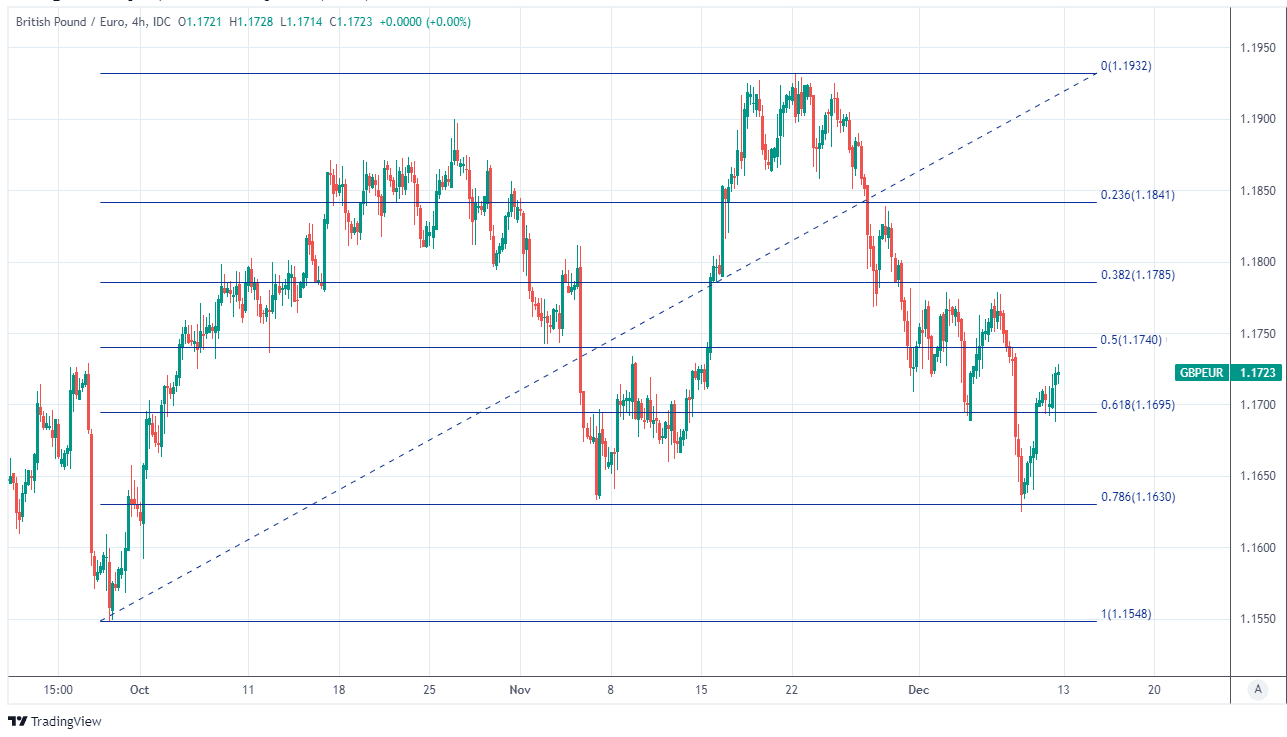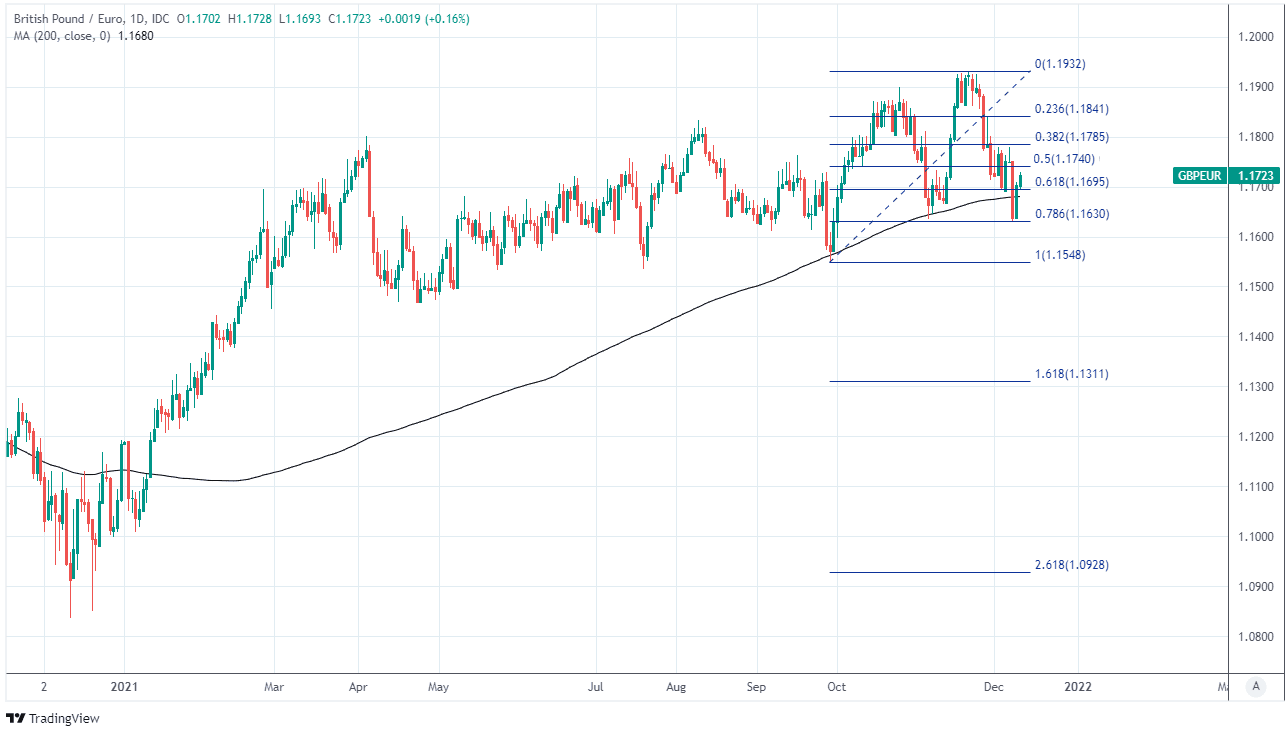Pound / Euro Week Ahead Forecast: Burdened by Restrictions
- Written by: James Skinner, Additional Editing by Gary Howes
- GBP/EUR facing struggle to hold 1.1700
- May see slippage to 1.1550 multi-week
- As risk of further virus restrictions rises
- Amid a possible Gov U-turn on roadmap
- Stokes doubt over outlook for BoE rates
- Fed, BoE & ECB the highlights this week

Above: Prime Minister Boris Johnson announces a significant capacity increase to the UK's booster programme on December 12. Image Tim Hammond / No 10 Downing Street.
The Pound to Euro exchange rate was quick to rebound from last week’s short-lived sell-off but its plucky spirit risks being undermined by new Covid restrictions, the weight of which could potentially act to pull Sterling back near to 1.1550 this week or thereafter.
Last week's move to 'Plan B' containment measures was quickly followed by suggestions that a so-called 'Plan C' may soon be announced and so leaves the UK economy and currency on the edge of a slippery slope.
It makes for an uncertain backdrop against which the Bank of England will make its final interest rate decision of 2021, which is due to be announced at midday on Thursday.
“BoE speakers have essentially argued that the economy has likely met—and in fact exceeded—the standard described in the November meeting, but the Omicron variant adds a new wrinkle to the outlook that they will have to consider. Our base case is that this uncertainty will delay liftoff until the February meeting, which would likely weigh on Sterling further,” says Michael Cahill, a G10 FX strategist at Goldman Sachs.
Above: Pound-to-Euro rate shown at hourly intervals alongside GBP/USD.
- Reference rates at publication:
GBP to EUR: 1.1726 - High street bank rates (indicative): 1.1416 - 1.1498
- Payment specialist rates (indicative: 1.1620 - 1.1667
- Find out more about specialist rates, here
- Set up an exchange rate alert, here
- Book your ideal rate, here
It’s possible this week's likely decision by the BoE to leave Bank Rate at 0.10% would crimp market appetite for the Pound, although perhaps only to a limited extent given that investors no longer expect any rate rise.
“The decision on whether to raise interest rates next week is probably still finely balanced. Given uncertainties about the health and economic impact of the omicron wave, we are inclined to think that a majority on the MPC, perhaps with the same vote split as last month, will opt to wait for more information before deciding to increase the cost of borrowing,” says Hann-Ju Ho, an economist at Lloyds Commercial Banking.
Last week’s Pound-Euro losses were limited in the first place and had been pared away by Friday but the lingering risk of a further government reversal on its roadmap to a reopened economy potentially limits its scope to extend that recovery over the coming days.
"Talk of a 'Plan B+' or 'Plan C' are already in the works. And it's very possible, in our view, that conversations around a light touch lockdown after Christmas will certainly gain traction. We will be watching this very closely," says Sanjay Raja, an economist at Deutsche Bank.
Furthermore, the BoE decision will be followed by the latest from the European Central Bank (ECB) and this could potentially act as a headwind for GBP/EUR if it enables the closely-connected as well as recently-resilient EUR/USD to further resist any incremental advances by the U.S. Dollar this week.
{wbamp-hide start}
{wbamp-hide end}{wbamp-show start}{wbamp-show end}
“We think that the GBP can remain vulnerable in the run up to the meeting,” says Valentin Marinov, head of FX strategy at Credit Agricole CIB.
“While the latest pandemic restrictions are nowhere near as onerous as those introduced in a number of European countries in recent weeks, the GBP can continue to suffer as market participants reassess the prospect for BoE tightening,” Marinov wrote to clients on Friday.
This is unless the BoE surprises on Thursday with a possibly unlikely decision to raise Bank Rate from 0.1% to 0.25%, a move for which the market-implied probability had fallen to around 10% by last Friday and from some some 33% last Monday.
Sterling’s recovery prospects appear limited but the flip-side of the market’s recent repricing of the BoE outlook is that any surprise decision to lift the benchmark this week would be likely to provide a sizeable uplift to the currency.
Nonetheless, minutes of the BoE’s November and September meetings as well as the various subsequent commentaries of policymakers have arguably always made February the most likely time for any eventual decision to begin reversing the rate cuts that were announced at the onset of the coronavirus crisis last year.
Above: Pound to Euro rate shown at 4-hour intervals with Fibonacci retracements of October rally indicating likely areas of technical support.
Secure a retail exchange rate that is between 3-5% stronger than offered by leading banks, learn more.
Once past Thursday’s central bank decisions the Pound could potentially remain dogged by the risk of further restrictions on business activities and social contact now that the government has shown signs of wavering on its commitment to irreversibly reopening the economy.
“The UK government’s decision to revert to plan B and tighten restrictions in response to the threat posed by the new Omicron variant will dampen the near-term growth outlook and likely encourage a more cautious BoE to hold off from raising rates,” says Lee Hardman, a currency analyst at MUFG.
UK economic growth already slowed sharply in October - official data revealed last Friday - and price action in the short-term interest rate space has shown that investors are so far inclined to respond to adverse coronavirus developments in the UK by marking down expectations for the BoE's interest rate.
This collectively poses enduring risks to Sterling because there remains scope for the market to doubt its assumptions about interest rates for 2022, which would likely encroach upon appetite for the Pound.
“In these circumstances, we continue to favour further GBP weakness in the near term especially against the USD, and expect cable to fall below the 1.3000 for the first time in just over a year. The timing of lift off for rate hikes by the BoE and Fed will appear to be narrowing considerably if the BoE delays raising rates again while the Fed speeds up tightening plans” MUFG's Hardman warned in a Friday research note.
The Pound-Euro rate would come under pressure and could potentially trade as low as 1.1550 if MUFG is right about the above pushing the Pound-Dollar rate to 1.3000 or below over the coming weeks.
Above: Pound to Euro rate shown at daily intervals with 200-day moving-average under pressure, and Fibonacci retracements of October rally indicating likely areas of technical support.
The Pound-Euro rate always closely reflects the relative performances of GBP/USD and EUR/USD, and would be likely to fall beneath 1.16 over the coming weeks if the Euro-Dollar continues to show the same resilience that kept it from falling much below 1.13 last week.
That’s where Thursday’s ECB policy decision and its eventual impact on EUR/USD comes into the picture, given that rallies in EUR/USD often induce declines in the Pound-Euro rate and vice versa.
“For the EUR, we think next week's setup might warrant some consolidation, reflecting the sketchiness in markets, seasonal factors, and what appears to be excessive USD demand,” says Mark McCormick, global head of FX strategy at TD Securities.
“For the first time in a while, the EUR offers a nice discount, trading around -1 standard deviation. Short positioning is a crucial driver, underscoring the prospects of a knee-jerk bounce next week, especially as hedge funds are a big driver of the short position,” McCormick warned last Friday.
The ECB has already telegraphed to the market that its €1.85 trillion pandemic-inspired quantitative easing programme is set to close around the end of March when the monetary allocation to it is likely to be all but exhausted.
However, Euro-Dollar and the Pound-Euro rate in turn could both be sensitive this week to whether the ECB announces a compensatory top-up to the monthly bond purchases carried out under its original quantitative easing programme known as the Asset Purchase Facility, or APP.
Many in the market have been waiting for this announcement but in light of economic uncertainties connected to the new variant of coronavirus and due in part to recent record high inflation numbers, there’s a chance the ECB may delay or altogether avoid such a decision.
That would be an upside risk to the Euro-Dollar rate and downside risk for the Pound-Euro rate.








